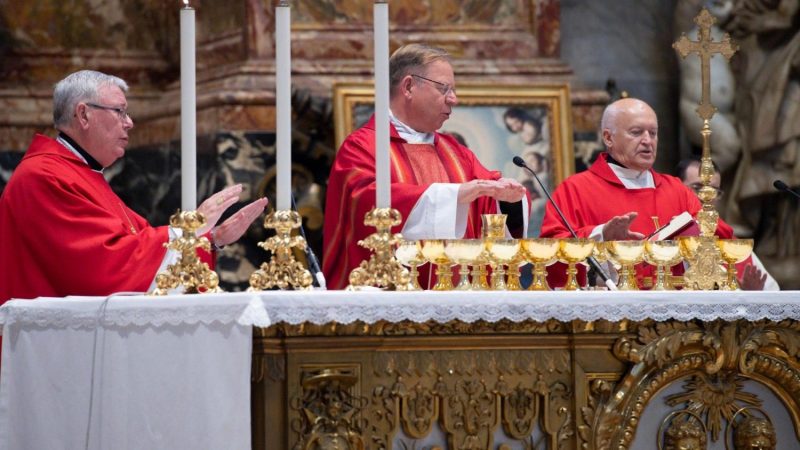It is an appeal to mankind to be open to the peace that comes from God, that was launched by Archbishop Gintaras Grušas in the homily from the Mass celebrated at the opening of the day at the Synod of Bishops. The focus is, of course, also on the situation in the Holy Land which the Council of European Bishops’ Conferences is following closely, but it begins from a more global vision, which concerns all conflicts and the commitment to peace to which all the baptised are called.
A peace that – the CCEE president said – is not the peace that the world gives, but the “shalom, the peace that comes from God’s inner life. Every baptized person, having received God’s salvific grace, must be an active channel of this peace”.
Archbishop Grušas centred his homily on St Luke, whose feast day we celebrate today. A saint – he explains – whose “life and work demonstrate for us a synodal mentality”. Luke is faithful and “we too are called to remain faithful in our commitment to walk together in the life of the Church and through the difficulties of the journey”. Luke also “often highlights the important role of women in the life of the Church”, he is a “Marian” Evangelist, one might say. Luke “is also the one who describes, best of all, the traits of Jesus’ heart, who reveals to us the immensity of God’s divine mercy”. Finally, Luke, both in his Gospel and in the Acts of the Apostles, “shows clearly that the Holy Spirit is the protagonist in the life and growth of the Church, as He must be in leading our synodal process”.
In short, argues the CCEE President, “If Luke were documenting the synod, thanks be to God, he would find many of the themes that he favoured at the forefront of our own deliberations in these days”.
The Gospel of the day is the one in which Jesus sends the 72 disciples to anticipate his coming and asks them to “pray for more laborers for the harvest”, because all the baptised are equal and are called, and He instructs them to greet the interlocutor on entering every home with “peace to this household”.
“These laborers – affirms Archbishop Grušas – are carriers of God’s peace, to a world in great need of peace. Not the peace as the world gives, but shalom, the peace that comes from God’s inner life. Every baptized person, having received God’s salvific grace, must be an active channel of this peace”.
Jesus adds that if in the house “If a peaceful person lives there, your peace will rest on him; but if not, it will return to you”. The CCEE President commented: “The term in Greek is literally ‘a son of peace’: a person open to and living in God’s peace. His peace, like his mercy is offered to all, but Jesus knows that not all will be willing to receive it”.
In summary, shalom, or inner peace, is “the sign of receiving and, of being received into God’s mercy”, and “the Church is open to all, but as with God’s peace it is given on God’s terms, not man’s”.
Archbishop Grušas concluded: “As we continue to talk about what processes, structures and institutions are needed in a missionary synodal Church, we need to make sure that these do in fact assist the mission of bringing the Good News to those who are in need of salvation. Synodality (including its structures and meetings) must be at the service of the Church’s mission of evangelization and not become an end in itself”.
The call to all the baptised to be channels of peace comes as the humanitarian situation in Gaza worsens. The CCEE, which has visited the strip several times as part of the Holy Land Coordination pilgrimages, strongly condemns the terrorist attacks that have provoked the escalation. At the same time, the CCEE cannot fail to be concerned about the humanitarian situation and joins in the appeal of the Patriarchs of the Holy Land to reduce the escalation of the war and activate humanitarian corridors to allow the people of Gaza to leave the conflict zone and avoid a humanitarian tragedy.
Photo: vaticannews.va

